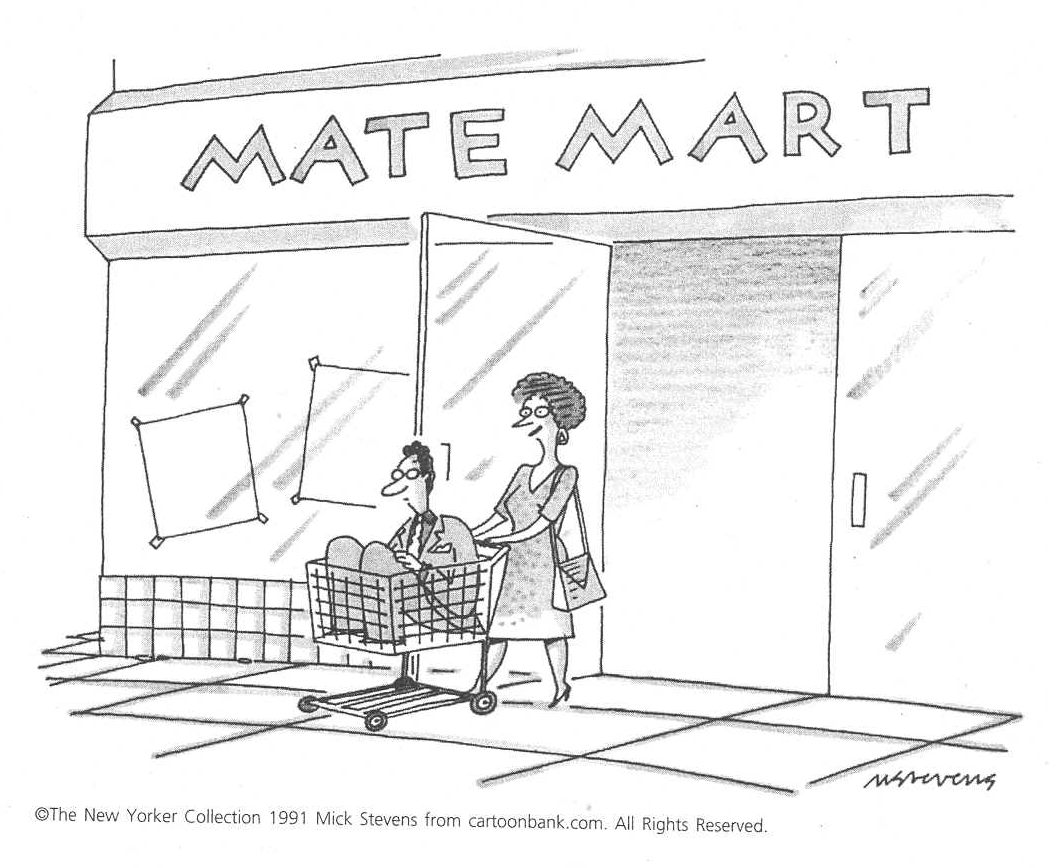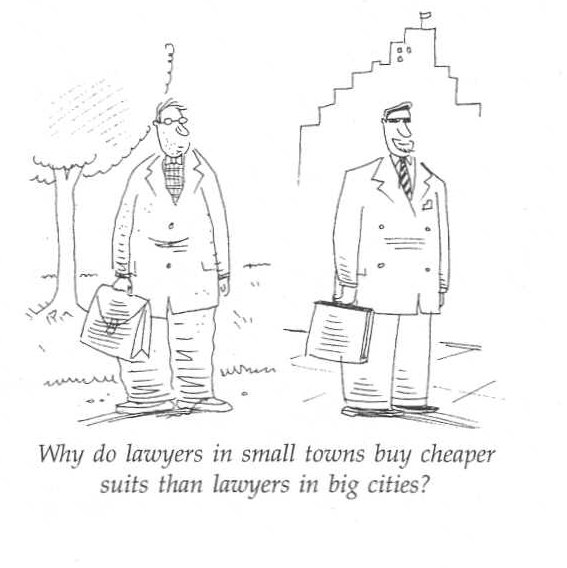
ECON 356 - Outline Eight
The Economics of Information - And Choice Under Risk/Uncertainty
We most often (pretty much always really) make decisions about things without perfect information. This fact can explain why a lot of institutions exist -- to help us with this information problem (advertising being an obvious one -- but later we will see that the firm is also one).
The basic consumer choice model assumes perfect information -- about what is out there to choose from, the prices, etc.
So let's drop this assumption and talk about how we gather and evaluate information.
The Economics of Information
Communication between Potential Adversaries
It is different to talk about communication between people that have similar goals versus between those who consider themselves adversaries (have different goals).
For example - let's take trade. The seller and the buyer both have different goals: the seller wants more producer surplus and the consumer wants more surplus for herself. Therefore both might be likely to deliberately misrepresent their true positions.
Bridge partners -- on the other hand -- have no reason to communicate anything that isn't true to each other. So each partner can pretty much trust that the other partner is providing good information. The only problem here is how to transfer the information -- not whether it is good or not.
But -- with adversaries the problem extends beyond conveying information. Since each party isn't trusting the other -- there needs to be ways that one (or both) parties can convey to the other that they are being honest. Just saying so usually isn't enough.
Therefore -- people have devised different ways of signaling.
Signaling: communication that conveys information (usually in some indirect way)
There are two important properties to signaling if it is to be effective:
1) signals must be costly to fake;
2) if some individuals use signals that convey favorable information about themselves, others will be forced to reveal information even when it is considerably less favorable.
Let's see what these mean:
1) The Costly-to-Fake Principle:
Economic Implications:
Product Quality Assurance: Non-salvageable asset investment -
Repeat purchase -
What else?
Types of goods (Philip Nelson)
Search good:
Experience good:
Credence good:
Argument - won't advertise a bad experience good. Credence good more questionable.
Choosing a Trustworthy Employee: Group membership? What else?
Choosing a Hard-Working, Smart Employee: College Degree? What else?
Screening or Signaling?
2) The Full-Disclosure Principle: individuals must disclose even unfavorable qualities about themselves, otherwise their silence is taken to mean that they have something even worse to hide.
Derives from the fact that potential adversaries do not have access to the same information – asymmetric information.
Economic Implications:
Product Warranties: even those with lower quality will offer warranties (not as good) or they will be seen as even lower than they are.
Regulating the Employment Interview: Anti-discrimination laws prohibit employers from asking about marital status and plans for having children. What happens?
The Lemons Principle (George Akerlof): Why do new cars lose a lot of value right after they have been driven off of the lot?
Criticisms of the theory:
a. Assumes that all demanders are risk averse.
b. Assumes there’s no utility in simply owning a new car.
c. Assumes there’s no utility in having a change to a new car.
d. Basically – no other reasons for selling a used car other than it is a lemon...
The Stigma of the Newcomer: Why do people move? Does moving a lot or having a lot of jobs give a bad signal? What can you do about it?
Choosing a Relationship:

Why don’t dating services work very well? Or do they?
Why is coyness (artfully or affectedly shy or reserved; slyly hesitant) often an attractive attribute? What does it signal?
Conspicuous Consumption as Ability Signaling:

Why don’t college professors dress very well – or is “casual” dress its own signal (what about across disciplines within the college)?
Why don’t people in Durango dress very well – including professionals?
Price and Placement as Quality Signals
Do consumers judge quality by price? If so .....
Resale Price Maintenance or Suggested Retail Price – Why?
Retail stores have their own quality reputations (they do the quality search for you). So where do you want your good to be sold?
A final point: When a real world market functions differently than it would if consumers were fully informed, it does not mean that the market is necessarily inefficient. Informing consumers is costly, and that usually means that it is efficient for consumers to be something less than fully informed! That is, the costs of informing consumers may be greater than the benefits produced.
Limited Price Information and Search
Consumers may lack information about product prices as well as product qualities. We will see later – in the model of “perfect competition” – everyone has perfect information and therefore it is impossible for a firm to sell at a different price than another firm (hogwash of course). In reality – there usually is a range of prices or price dispersion. This is due (at least in large part) to lack of knowledge by consumers (there can be other reasons that prices differ from place to place for the same produce - cost differences, for example).
Consumer search – because of this consumers will search for the best price (given the cost). So these are called search costs.
How long will the consumer search?
There is benefit from acquiring price information - but the marginal benefit from this search drops as the search goes on (less likely to acquire more or better information after some time).
There is cost to searching – and the marginal cost of the search increases with time (as you pull more resources into searching, your opportunity cost increases – same as with the supply of a firm).
So the consumer will search, theoretically, until the marginal benefits of the search = marginal cost.
GRAPH:
What if all consumers increase their search intensity? What should happen to price dispersion?
Will the benefit of searching be higher if the price of the good is higher?
Will lower priced firms advertise more than higher priced firms? If so, what would that do to price dispersion?
Advertising - So what is advertising designed to do?
GRAPH:
But if the advertising isn’t successful for a single firm – is that a waste of resources? Some say yes, others say no. Why?
Insuring Against Bad Outcomes
First let’s distinguish between risk and uncertainty:
Risk:
Uncertainty:
Most of the time we deal with uncertainty. If we narrow the problem down, we can call it risk. For example – will something happen to me? Yes or no – two possible outcomes. Will my house burn down or not, etc.
So what about the probability? Do “number of times it happens in general” stay the same over time? If so – then we can determine a probability.
Law of Large Numbers: The larger the number of people, the smaller the probability it will be me (given that the number of times the event happens doesn’t change as the population changes).
For example: If there are 10 people in the population and there are always 2 house fires every year – the probability my house will burn down (20%) is greater than if there were 100 people in the population (2%).
Pooling the Risk:
This is often why we will pool the risk. It’s not so much that the event will not happen to me – but that I am decreasing my loss if it does.
Examples:
Joint Ownership:
Insurance Markets: Private insurance companies – share the risk. Everyone pays a premium, a few use it.
If I lose – I share the cost with others.
If I don’t lose – I partly pay for those who do.
This plays on the law of large numbers for the insurance companies – allows insurance companies to “predict” better how much revenue they will need (assuming number of times things happen, how many people, etc.).
Some say insurance is an “unfair gamble” – we pay more in than is paid out because the insurance company keeps part of the premiums for operations and profit. But – we still do it – so?
Also – problems with insurance:
Adverse Selection:
Problem – those who need it most will buy insurance most often. If the premium price is the same for all – then those who need it less will most likely drop out – and all that is left are those who will cost the insurance company a lot of money.
This is why insurance companies want to charge different prices – more below.
Moral Hazard:
Similar results as with adverse selection.
Therefore, insurance companies (and all of us) practice:
Statistical Discrimination:
http://www.slideshare.net/MikeAnderson/car-insurance-accident-statistics
Is this fair? Certainly the individual within the group that is “above” the average is hurt – the person “below” the average gains. How do we set ourselves apart from the group? Not easy. This goes back to "signaling."
How might the statistical average change over time?
Might there be a lag in this change being noticed or used in decisions?
Application:
When should you be insured and when should you not?
Depends on what?
Is insurance “irrational” from a mainstream economists point of view? Why not from a common sense point of view?
What if insurance is mandated? All must buy auto insurance? All must buy health insurance? Is there a difference in the two?
Would the healthy end up paying for the sick – is this why politicians want it to be mandatory – they know healthy people would opt out?
But what about firms opting out? For example health insurers Wellpoint, Cigna, Aetna, Humana and CoventryOne have announced that they will stop writing policies for all children due to the health care bill passed this year. And the Principal Financial Group left the market altogether. Why?
What would you predict will happen in 2014 when all adults must be covered?
What about young versus old – would there be a redistribution of wealth?